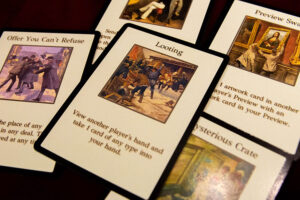Note: This preview uses pre-release components and rules. What you see here may be different from the final, published game. This post was a paid preview, you can find out more information here.
 I am not intimately familiar with the inner workings of art galleries. But, at least here in Fool’s Gallery, they are really hard up for paintings to exhibit. Here’s where we come in. Bring in some famous paintings, they will put them on display and thereby increase their prestige and your personal wealth. Finding valuable paintings isn’t necessarily easy though, forgery’s abound. And if you get caught trying to pass off a fake as the real thing—well, that’s really bad. Who wants an art gallery full of fake paintings?
I am not intimately familiar with the inner workings of art galleries. But, at least here in Fool’s Gallery, they are really hard up for paintings to exhibit. Here’s where we come in. Bring in some famous paintings, they will put them on display and thereby increase their prestige and your personal wealth. Finding valuable paintings isn’t necessarily easy though, forgery’s abound. And if you get caught trying to pass off a fake as the real thing—well, that’s really bad. Who wants an art gallery full of fake paintings?
So let’s talk about Fool’s Gallery’s gameplay and see if it’s the type of game for you.
Gameplay Overview:
There are 60 different pieces of art depicted in Fool’s Gallery, spanning six different collections based on type—Impressionist, Renaissance, etc… However, there are 120 cards because each piece of art has a forged version as well. You’ll start the game being dealt seven cards from the art deck.
You can freely examine any of the cards in your hand to determine their authenticity. You do so by scanning the QR code on the back of the card and you will quickly be told if you have the actual I and the Village by Chagall or just some paint slapped on by a random person in their garage. Now of course, just because it’s a fake doesn’t mean you have to throw it away. There’s always a chance you can get away with it.

Each turn you’ll take the following steps, all of which are optional but have to be done in order if they are performed:
- Sell – Sell any artwork already in your preview for 2 coins each.
- Examine – Inspect a card in another player’s preview or the gallery to determine its authenticity. If it’s real you’ll pay that player coins for the inconvenience. If it’s fake, they have to pay you in coins or artwork.
- Event – Play or draw an event card.
- Gallery – Add art from your preview to a gallery. Each gallery can only have five pieces displayed. You can also pay three coins to swap art out of a gallery instead of adding. Any gallery with five artwork cards can be closed by paying a coin.
- Preview – Add cards from your hand to your preview. You can have a maximum of three previewed cards.
- Draw – Draw one card or gain one coin.
Once all the exhibits have been closed or the artwork deck is exhausted, the game ends. Players earn points for each piece of art they have on display and for having majorities in each gallery. The player with the most points is declared the winner.

Game Impressions:
What drew me to Fool’s Gallery was the use of QR codes to determine the authenticity of the artwork on the cards. From a purely technological perspective, it works quite well. The website that launches to examine your art is quick and responsive. And, other than your initial hand of seven cards, you rarely have to scan more than one each turn.

Most of the strategy comes down to how careful you want to be with what you are adding to the gallery. You can certainly take the approach of filling your preview every turn and stuffing it all in the gallery without worries about having the majority in certain collections or validating that you even have real art. Sometimes you’ll get away with this, but as there is a real for every fake, someone might eventually find you out. And when they do, it can be a costly interaction.
When you are caught with a fake in your preview you lose a coin, a card from your preview, or a card from your hand. And the examining player gets to choose. If that fake painting is examined in an exhibit you lose twice as much. When you have a fake painting on display anywhere, none of the art in your preview is ever safe, which can be terrifying when trying to close galleries.

Once a gallery has been closed it can no longer be added to, swapped out, or examined. Your fake art is finally safe. So rushing the closure of Impressionist art with your knock-off Starry Night on display might be a great idea. Hopefully, you can manage without drawing too much suspicion.
Final Thoughts:
Fool’s Gallery is a good little game of tactical card play that makes solid use of QR code technology. Everyone can immediately be an art expert and separate the real from the fakes with no problem. You just need the time to do so while also trying to prepare your collection for the gallery.
Not to mention the game is just full of great art from the likes of Picasso, Raphael, Rembrandt, and dozens of others. It makes for a pretty game to look at as well. If you are interested in picking up a copy, Fool’s Gallery is available for order.
Source: Board Game Quest





